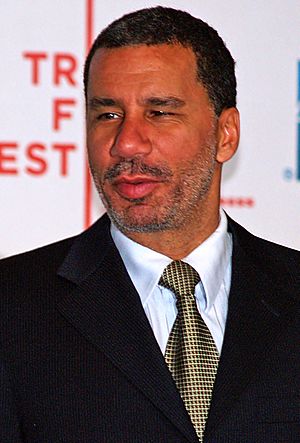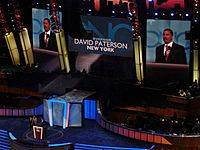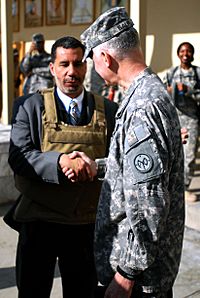David Paterson facts for kids
Quick facts for kids
David Paterson
|
|
|---|---|

Paterson at the 2008 Tribeca Film Festival
|
|
| 55th Governor of New York | |
| In office March 17, 2008 – January 1, 2011 |
|
| Lieutenant | Joseph Bruno (acting) Dean Skelos (acting) Malcolm Smith (acting) Pedro Espada Jr. (acting) Richard Ravitch |
| Preceded by | Eliot Spitzer |
| Succeeded by | Andrew Cuomo |
| Lieutenant Governor of New York | |
| In office January 1, 2007 – March 17, 2008 |
|
| Governor | Eliot Spitzer |
| Preceded by | Mary Donohue |
| Succeeded by | Joseph Bruno (acting) |
| Chair of the New York State Democratic Committee | |
| In office May 21, 2014 – November 4, 2015 |
|
| Preceded by | Keith L. T. Wright |
| Succeeded by | Sheila Comar |
| Minority Leader of the New York State Senate | |
| In office January 1, 2003 – December 31, 2006 |
|
| Preceded by | Martin Connor |
| Succeeded by | Malcolm Smith |
| Member of the New York State Senate | |
| In office December 10, 1985 – December 31, 2006 |
|
| Preceded by | Leon Bogues |
| Succeeded by | Bill Perkins |
| Constituency | 29th district (1985–2002) 30th district (2003–2006) |
| Personal details | |
| Born |
David Alexander Paterson
May 20, 1954 Brooklyn, New York City, U.S. |
| Political party | Democratic |
| Spouses | |
| Children | 2 |
| Parent | Basil Paterson |
| Education | Columbia University (BA) Hofstra University (JD) |
| Signature | |
David Alexander Paterson (born May 20, 1954) is an American politician who served as the 55th governor of New York from 2008 to 2010. He made history as the first African-American governor of New York and the first legally blind person to be governor of a U.S. state.
Paterson became governor after Governor Eliot Spitzer resigned. He took office during the Great Recession, a difficult economic time for the country. As governor, he had to make tough decisions to cut the state's spending. He also made important appointments, including choosing Kirsten Gillibrand to become a U.S. Senator for New York.
After his time as governor, Paterson hosted a radio talk show and served as the chairman of the New York Democratic Party. In 2020, he wrote a book about his life called Black, Blind, & in Charge: A Story of Visionary Leadership and Overcoming Adversity.
Contents
Early Life and Education
David Paterson was born in Brooklyn, New York. His father, Basil Paterson, was also a well-known politician who served as a New York state senator and New York Secretary of State.
When Paterson was just three months old, an infection damaged his optic nerve. This left him completely blind in his left eye and with very limited vision in his right eye. His family moved to Long Island so he could attend a public school that would allow him to be in regular classes instead of special education. He graduated from Hempstead High School in 1971.
Paterson went on to earn a degree in history from Columbia University in 1977. He then received a law degree from Hofstra Law School in 1983. After law school, he worked for the District Attorney's office in Queens.
Political Career
New York State Senate
In 1985, Paterson was elected to the New York State Senate, representing parts of Manhattan, including Harlem. This was the same seat his father once held. He was re-elected ten times and served in the senate for over 20 years.
In 2003, his fellow Democrats in the senate elected him as their leader, a position called the Minority Leader. This made him the highest-ranking Black elected official in New York's history at the time. He was known for being good at working with others and for his smart political skills.
Lieutenant Governor
In 2006, Eliot Spitzer, who was running for governor, chose Paterson to be his running mate for lieutenant governor. They won the election by a huge margin. Paterson became the Lieutenant Governor of New York on January 1, 2007.
As lieutenant governor, Paterson helped pass a law to fund stem-cell research. He also spoke out in favor of allowing noncitizens to vote in New York City elections, a position that was different from Governor Spitzer's.
Governor of New York (2008–2010)
In March 2008, Governor Spitzer unexpectedly resigned from office. As lieutenant governor, Paterson automatically became the new governor. He was sworn in on March 17, 2008.
Paterson became governor during a very busy time. He had only two weeks to work with lawmakers to create a state budget and deal with a nearly $5 billion shortfall. He also had to lead the state through the 2008 financial crisis, which was especially hard on New York's economy.
Because he is legally blind, Paterson's staff would read documents to him or record them on voice mail so he could listen.
Major Decisions as Governor
Same-Sex Marriage
In 2008, Governor Paterson ordered all state agencies to recognize same-sex marriages that were legally performed in other places, like Canada or Massachusetts. This meant that same-sex couples could receive the same benefits as other married couples. This was a big step for marriage equality in New York.
In 2009, he proposed a law to make same-sex marriage legal in New York. The bill did not pass at the time, but his efforts helped pave the way for it to become law in 2011, after he left office.
Handling the Financial Crisis
Paterson took office as New York was facing its worst money problems in years. He gave a special TV address to warn New Yorkers about the state's growing budget deficit. He called for major cuts in government spending to help fix the problem.
His 2009 budget included what he called "deep and painful" cuts to many state programs. He even took a 10% pay cut himself to show that everyone needed to sacrifice.
Appointing a U.S. Senator
When Senator Hillary Clinton became the U.S. Secretary of State in 2009, her Senate seat became vacant. It was Governor Paterson's job to choose her replacement. Many famous people were considered for the job, including Caroline Kennedy, the daughter of President John F. Kennedy.
After a lot of public discussion, Paterson chose Kirsten Gillibrand, a congresswoman from upstate New York. Gillibrand has served as a U.S. Senator for New York ever since.
Challenges in Office
During his final year as governor, Paterson faced some difficult situations. There were questions about how a contract for a new casino was awarded. He was also investigated for accepting free tickets to the World Series, which was against the rules for a governor. He was later fined for the tickets.
These challenges led him to decide not to run for a full term as governor in the 2010 election. He finished his term and left office at the end of 2010.
Later Career
After leaving the governor's office, David Paterson remained active in public life. He hosted a popular afternoon radio show in New York City for several years.
He has also held positions on the board of the Metropolitan Transportation Authority (MTA), which runs New York's subways and buses. In 2013, he became a professor at Touro College, teaching about health care and public policy.
In 2014, he served as the chairman of the New York Democratic Party for about a year and a half. In 2020, he published his autobiography, Black, Blind, & In Charge: A Story of Visionary Leadership and Overcoming Adversity.
Personal Life
Paterson was married to Michelle Paige from 1992 to 2014, and they have one son. In 2019, he married Mary Galda.
Paterson is known for his sense of humor. In 2010, he even appeared on the TV show Saturday Night Live in a comedy sketch alongside actor Fred Armisen, who was playing him.
See also
 In Spanish: David Paterson para niños
In Spanish: David Paterson para niños
 | Delilah Pierce |
 | Gordon Parks |
 | Augusta Savage |
 | Charles Ethan Porter |



